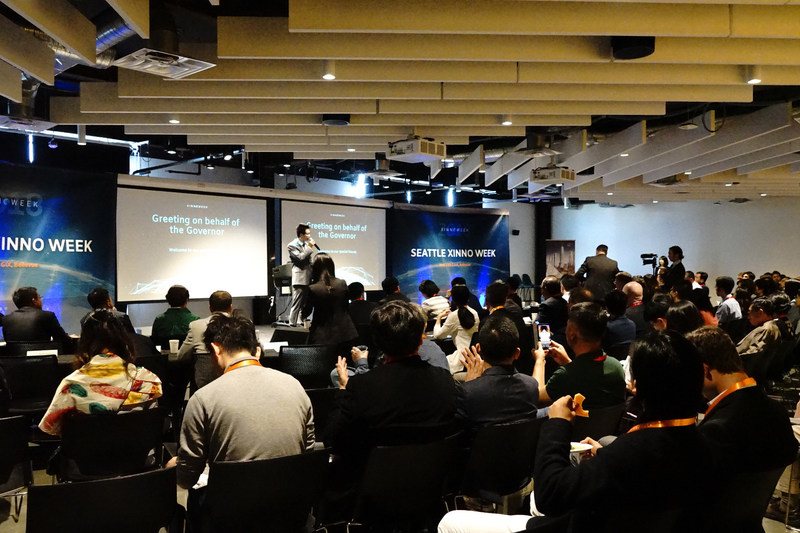SEATTLE, May 15, 2018 /PRNewswire/ — VestLink, a Seattle-based innovation platform, kicked off its inaugural 2018 Cross-Border Innovation (Xinno) Week on Sunday with an open-to-the-public Opening Day featuring the best of tech talent, entrepreneurs and investors from across the Pacific North-West and China to discuss emerging technology trends such as AI, Machine Learning, IoT, Blockchain, EdTech, HealthTech and FinTech.

Xinno Openning Day
VestLink is a platform for connecting Seattle-based global innovators with the China market. Founder and CEO Amy Du says there are logistic and cultural challenges involved in fostering collaboration between US and Chinese companies and their aim is to bridge these gaps:
“We need to bring these partners onto the same platform, into the same room, for them to have a mini conversation and the goal for that conversation is not to just meet and greet, but to become a starting point for people to explore interest and then have the opportunity to follow up and foster real partnership and real investment and that’s why we created Xinno Week.”
Seattle’s population is one of the fastest growing in the US. San Francisco for its part lost 24,000 people, many of whom simply jumped ship and headed north to The Emerald City. The US Census revealed that from 2016 to 2017 Seattle was the only metropolitan center north of the Sunbelt to have more people moving in than leaving.
People came for more affordable living, a better lifestyle, but more pertinently, they came to work in tech.
Of all new office jobs created in Seattle over the past two years, 69% have been in tech. IBM, Intel, Google, Apple – they’re all here. China’s big players – Baidu, Alibaba and Tencent – have all followed suit. In an era of growing cross-border innovation and collaboration, Chinese firms are now coming to Seattle too, to recruit, collaborate, invest, and acquire.
VestLink CEO Amy Du experienced this all first hand when she became one of the very first consultants at Chinese systems integrator Digital China to be sent to Seattle to assist Microsoft. Through her connections on both sides of the Pacific, Amy introduced a local startup to one of China’s biggest IT consulting firms iSoftStone; iSoftStone later acquired the startup and set up its US HQ in Seattle, where Amy ultimately took up the role of Vice-President, Worldwide Services.
Yet in promoting China–Seattle collaboration and investment, Seattle needs to do more than overcome cultural differences; they must compete for attention with Silicon Valley’s decades-long history as a high-tech hub.
VestLink was created to fill this gap in Seattle. It now runs its own co-working space and incubation center designed specifically for startups with an interest in China. It also welcomes Chinese company, government or investment delegations almost every other week to host events and connect with local entrepreneurs.
In education and research, Seattle finds itself locked in a similar scenario. University of Washington (UW) with its world-class computer science faculty still generates far less companies from its graduate pool than does Stanford.
Still, UW’s in-house incubator program Co-Motion recently partnered with Beijing’s prestigious Tsinghua University to co-launch the Global Innovation Exchange in the first-ever case of an official Chinese educational institution setting up its own brand abroad. In total, Co-Motion has produced 81 startup companies since 2013. It all points to a very encouraging trend in Seattle–China innovation collaboration.
Just last year, Amazon in cooperation with United Innovation Services (UIS) opened their Qingdao-AWS Joint Innovation Center in China to promote AWS cloud services application in the market and provide startups with technical training and funding support.
Vice-President of Amazon Web Services (AWS) Dorothy Nicholls is the tech giant’s highest ranking Chinese employee. She says Amazon represents a great case study of a company that entered China over ten years ago yet is still transforming today and finding their identity in the China market:
“So we ask ourselves: what do we want to be? What’s our strength to the Chinese consumers? You really have to take a step back. I think the bottom line for me… here is a US company trying to appeal to consumers in China, and we really have to figure out what’s our differentiation and what model we can have that’s defensible, that cannot be easily copied.”
GOT NEWS? click here
Google News, Bing News, Yahoo News, 200+ publications
Dorothy joined a group of more than 30 speakers and panelists present on Xinno Opening Day, including senior executives of 12 unicorns, to discuss the trends of cross-border collaboration.
“My team and I are looking to promote the technology and culture of the City of Jinan, and to attract local talents and companies here in Seattle to the city,” says Zhaocun Xie, chief executive of Lixia District in Jinan, who signed the contract with VestLink Group to establish the “Seattle Cross-border Innovation and Collaboration Center” on Xinno Opening Day. Bin Yin, CEO of UIS, a China-based incubator and fund which oversees the operations of over 20 science and technology parks located both in China and the US, is also participating in the week-long event.
Two more participants were Doctors Xuchen Yao and GuoGuo Chen, cofounders and former CEO and CTO respectively of Kitt.ai. PhD graduates at John Hopkins, Yao and Chen (both Chinese nationals) decided to move to Seattle to found their own startup; there they enrolled in the Allen Institute for AI where they developed a framework to build and power chat bots and voice-based applications. Within only a couple of years, the company was acquired by Baidu, which then went on to open its local R&D center. Amy Du says that for firms wanting to strengthen their competitive advantages in technologies like AI and Machine Learning, this “makes sense”; the best way being to set up an R&D center, the quickest to acquire a creditable local firm.
Yao and Chen represent just two instances of a huge influx of Chinese students that now accounts for a massive 50% of Seattle’s entire international student body. 3.4% of the population speak Chinese. China’s FDI (foreign direct investment) into the city continues to grow. More signs that Seattle is well set to facilitate further collaboration with Chinese companies.
VestLink has flown out investment partners from China and the Bay area for Xinno Week. Eight local startups, selected on the basis of their significant traction and interest in building cross-border collaboration with China will also be pitching to these US and China-based investors.
About Xinno Week
Xinno Week provides a platform for entrepreneurs, innovators, business and industry leaders to connect and gain valuable insights of technology and investment trends in both the US and China markets, to discuss emerging opportunities and foster future partnerships and collaboration. The event is jointly hosted by the Chinese Chamber of Commerce in Washington State (CCCWA), VestLink, MSUP and the Chinese Young Professionals Association (CYPA). Xinno Week kicks off in Seattle this Sunday 13 May.
About VestLink
VestLink is a leading platform for connecting global innovators with the China market. Entrepreneurs, angel investors and venture capitalists are able to leverage VestLink’s large and rapidly growing network of startups and innovators to connect with investment opportunities in AI, Machine Learning, Big Data, IoT, CloudTech, HealthTech, FinTech, EdTech, RetailTech, smart cities and AR/VR. Its Seattle-based incubation center and co-working space, supported by its consulting expertise and team of seasoned mentors, creates an environment to accelerate startup growth with a unique focus on cross-border business and collaboration.
Please visit https://www.xinnoweek.org/ for more information.
![]() View original content with multimedia:http://www.prnewswire.com/news-releases/cultivating-the-future-of-cross-border-innovation-collaboration-vestlinks-xinno-cross-innovation-week-leverages-the-power-of-seattle-tech-hub-to-make-china-inroads-for-local-startups-300648737.html
View original content with multimedia:http://www.prnewswire.com/news-releases/cultivating-the-future-of-cross-border-innovation-collaboration-vestlinks-xinno-cross-innovation-week-leverages-the-power-of-seattle-tech-hub-to-make-china-inroads-for-local-startups-300648737.html
SOURCE VestLink






